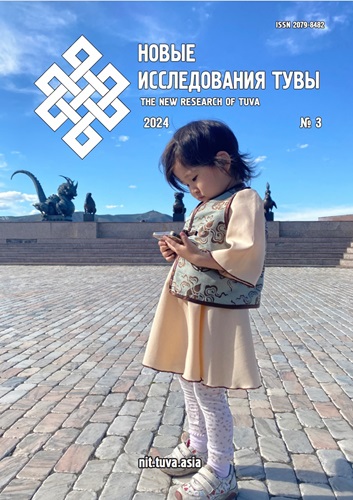Ideological discussions and the search for the historical subjectivity of Kazakh society in the twentieth century
DOI:
https://doi.org/10.25178/nit.2024.3.15Keywords:
cultural hierarchy; historical narrative; ideological discussion; subjectivity; historical memory; history of Kazakhstan; nomadic culture; post-nomadismAbstract
The article examines the impact of the ideas of cultural hierarchy (imaginary low — high levels) and post-nomadic traumas (transformed culture of former nomadic society) on the discourse of Kazakh intellectuals, who in the twentieth century began searching for the historical identity of the Kazakh people. The authors note that sedentarism (the view of the settled world towards the nomadic world) is rooted in ideological priorities and the dialectic of narratives about the search for the historical identity of Kazakh society.
The destruction of the traditional way of life for Kazakhs as a result of forced collectivization and sedentarization in the 1920s and 1930s continued to be discussed in scientific and political discourse. Many members of the Kazakh intellectual community in the 1950s and 1970s produced historical and cultural narratives about the idea that nomadic culture was backward. However, there were also attempts to overcome the cultural trauma of being seen as “unhistorical”. The accepted way to overcome this trauma within the existing hierarchy was through the scientific and ideological exploration of the archaeological heritage of settled agricultural cultures on the territory of Kazakh SSR.
At the same time, some representatives of the new generation of Kazakh intelligentsia (O. O. Suleimenov, M. M. Auezov, N. E. Masanov) implemented the scientific and cultural incorporation of the historical subjectivity of the post-Nomads into the world history of civilization, without distancing themselves from the nomadic cultural heritage. However, almost a century later, the influence of the sedentarian hierarchies continues to persist in scientific, public and even official historical narratives of the 21st century.
References
Abylkhozhin, Zh. B. (1991) The traditional structure of Kazakhstan. Socio-economic aspects of functioning and transformation (1920–1930). Alma-Ata, Gylym. 240 p. (In Russ.).
Abylkhozhin, Zh. B. (2003) Kazakhstan: the ruralization of cities and the escalation of the conflict between “modernizing” and “traditionalist” identities. Tsentral'naia Aziia i Kavkaz, no. 6, pp. 190–198. (In Russ.).
Abylkhozhin, Zh. B. (2022) Essays on the history of the traditional structure of the Kazakhs in the first Soviet decades: cultural and socio-economic aspects. Almaty, LEM. 300 p. (In Russ.).
Akishev, K. and Ageeva, E. (1958) Ancient monuments of Kazakhstan. Almat, Kazakh State Publishing House. 60 p. (In Russ.).
Akishev, K., Baipakov, K. M. and Erzakovich, L. B. (1972) Ancient Otrar (Topography, Stratigraphy, Prospects). Almaty, Nauka. 214 p. (In Russ.).
Asfendiarov, S. A. (1930) Islam and nomadic farming. Ateist, no. 58, pp. 3–18. (In Russ.).
Auezov, M. M. (2016) The thread connecting the times. Almaty, Zhibek Zholy. 756 p. (In Russ.).
Auezov, M. (2011) Diaries: leave to return. Almaty, Zhibek zholy. 292 p. (In Russ.).
Auezov, M. (2018) The lives of wonderful people / ed. byG. M. Mutanova. Issue 131. Almaty, Қazaқ universitetі. 371 p. (In Kaz.).
Baipakov, K. M. (2014) From the history of the study of the archaeological and cultural heritage of Otrar, Otrar oasis and Kazakhstan. In: Materials of the international scientific and practical conference dedicated to the 40th anniversary of the work of the South Kazakhstan integrated Archaeological expedition / ed. by O. V. Kuznetsova. Almaty, s. n. 306 p. Pp. 8–14. (In Russ.).
Bustanov, A. (2017) Between a Nation and an Artifact: Oriental Archaeology in Soviet Kazakhstan. In: Muslims in the New Imperial History: a collection of articles / ed. by V. O. Bobrovnikov et al. Moscow, OOO «Sadra». 424 p. Pp. 76–98. (In Russ.).
Goloshchekin, F. I. (1930) Party building in Kazakhstan. Collection of speeches and articles (1925–1930). Moscow, Gos. Izd. RSFSR. 344 p. (In Russ.).
The Invention of Religion: Desecularization in the Post-Soviet context (2015) / ed. by S. Shtyrkov. St. Petersburg, European University Press. 280 p. (In Russ.).
Cameron, S. (2020) The Hungry Steppe: Famine, Violence, and the Making of Soviet Kazakhstan / transl. from Engl. Moscow, NLO. 212 p. (In Russ.).
Kradin, N. N. (2001) Nomads in the world historical process. Filosofiia i obshchestvo, no. 2 (23), pp. 108–138. (In Russ.).
Kradin, N. N. and Bondarenko D. M. (2002) A nomadic alternative to social evolution. Moscow, Institut Afriki RAN. 201 p. (In Russ.).
Krupko, I. V. (2023) Subjectivity of the Kazakh nomadic culture in the 1960s poetry of Olzhas Suleimenov. Ural Historical Journal, no. 1 (78), pp. 123–132. (In Russ.). DOI: https://doi.org/10.30759/1728-9718-2023-1(78)-123-132
Laumulin, M. T. (2000) Book review: “Le Kazakhstan” by Catherine Poujol. Paris: University Press, 2000. Kazakhstan-Spektr, no. 3–4, pp. 35–39. (In Russ.).
Levshin, A. I. (2005) Description of the Kirghiz-Kaysak or Kirghiz-Cossack hordes and steppes. Pavlodar, MON RK. PGU im. Toraigyrova, NPF «EKO». 212 p. (In Russ.).
Lidzhieva, I. V. (2023) “To look forward to settlement”: imperial policy in foreign territories. Kaspiiskii region: politika, ekonomika, kul'tura, no. 2 (75), pp. 11–20. (In Russ.).
Margulan, A. Kh. (1950) From the history of cities and the construction art of ancient Kazakhstan. Alma-Ata, AN KazSSR Publ. 122 p. (In Russ.).
Martin, T. (2002) An affirmative action empire: the Soviet Union as the highest form of imperialism? Ab Imperio, no. 2, pp. 55–87. (In Russ.).
Masanov, N. E. (1999) Kazakh political and intellectual elite: clan affiliation and intraethnic rivalry. Vestnik Evrazii, no. 1, pp. 46–61. (In Russ.).
Masanov, N. E. (2011) The nomadic civilization of the Kazakhs: the foundations of the nomadic society. 2nd ed / comp. by L. E. Masanova and I. V. Erofeeva. Alma-Ata, Print-S. 740 p. (In Russ.).
Masanov, N. E., Abylkhozhin, Zh. B. and Erofeeva, I. V. (2007) Scientific knowledge and myth-making in modern historiography of Kazakhstan. Alma-Ata, Daik-Press. 296 p. (In Russ.).
Nurpeisov, M. M. (2020) The fate of the medieval cities of Zhetysu on the Great Silk Road. Bulletin Abai KAZNPU, the series of “Historical and socio-political sciences”, vol. 4, no. 67, pp. 180–189. (In Russ.).
Pletneva, S. A. (1967) From nomads to cities. Moscow, Nauka. 208 p. (In Russ.).
Puzhol', K. (2015) Visible and invisible permanent memory of the nomadic culture of the space of post-Soviet cities. Mir Bol'shogo Altaia, no. 1 (3), pp. 260–265. (In Russ.).
Sinitsyn, F. L. (2021) Russia and the nomads. From antiquity to the revolution. Moscow, Veche Publ. 288 p. (In Russ.).
Suleimenov, O. O. (1975) Az and Me. Alma-Ata, Zhazushy. 304 p. (In Russ.).
Suleimenov, O. O. (1990) Nomads and culture: a Kazakh experiment. Essays, journalism. Poems, poems. Az and Me. Alma-Ata, Zhalyn. 592 p. (In Russ.).
Suleimenov, O. O. (2004) You are my hero. Collected works in 7 vols. Alma-Ata, Atamұra. Vol. 6. Publitsistika. 439 p. (In Russ.).
Suleimenov, O. O. (2023) It was like that... Almaty, Service press. 424 p. (In Russ.).
Tlostanova, M. V. (2020) The decoloniality of being, knowledge and feeling. Alma-Ata, Tsentr sovremennoi kul'tury «Tselinnyi». 192 p. (In Russ.).
Tolstov, S. P. (1934) The genesis of feudalism in nomadic pastoral societies. In: The main problems of the genesis and development of feudal society; Plenum of the State Academy of the history of material culture. June 20–22, 1933. Moscow, OGIZ Sotsial'no-ekonomicheskoe izdatel'stvo. Issue 103. 395 p. Pp. 165–199. (In Russ.).
Chelintsev, A. N. (1928) Prospects for the development of agriculture in Kazakhstan. Narodnoe khoziaistvo Kazakhstana, no. 4–5, pp. 1–39. (In Russ.).
Shvetsov, S. P. (1926) Nature and way of life of Kazakhstan: Kazakh economy in its natural-historical and everyday conditions. Leningrad, Narkomzem Kazak. ASSR. 186 p. (In Russ.).
Shnirel'man, V. (2009) The symbolic past. The struggle for ancestors in Central Asia. Neprikosnovennyi zapas, no. 4(66), pp. 70–86. (In Russ.).
Shtyrkov, S. (2011) The Soviet Roots of Ethnic Traditionalism: the case of North Ossetia. Neprikosnovennyi zapas. Debaty o politike i kul'ture, no. 4, pp. 66–79. (In Russ.).
Published
How to Cite
For citation:
Abylkhozhin Zh. B. and Krupko I. V. Ideological discussions and the search for the historical subjectivity of Kazakh society in the twentieth century. New Research of Tuva, 2024, no. 3, pp. 265-278 (In Russ.). DOI: https://doi.org/10.25178/nit.2024.3.15
Issue
Section

This work is licensed under a Creative Commons Attribution-NonCommercial 4.0 International License.

Author(s) license holder(s) grant rights for their work to the journal (grantee of a license) under the simple non-exclusive open license in accordance with Art. 1286.1 «Open license for a research work, work of literature or fine arts», Civil Code of the Russian Federation.
New Research of Tuva publishes articles under the Creative Commons Attribution-NonCommercial license (CC BY-NC).
Since it is an open license, author(s) reserve the right to upload the article to their institutional repository, submit it to another journal (if it allows republications), or republish it on their own website (in full, or in part).
However, several conditions apply here:
a) The republished version must always contain the name(s) and affiliation(s) of the author(s), the original title and the hyperlink to the original version on the New Research of Tuva website;
b) It must be in open access, free of charge, and no category of readers must be in any way whatsoever advantaged over general readership.
c) should the contribution be submitted elsewhere by its author(s) without substantial modification (30% or more of original text unchanged), the body of the article should contain a disclaimer that the original version was published in New Research of Tuva (with a link to the respective page)
The CC-BY-NC is a non-revocable license which applies worldwide and lasts for the duration of the work’s copyright.










